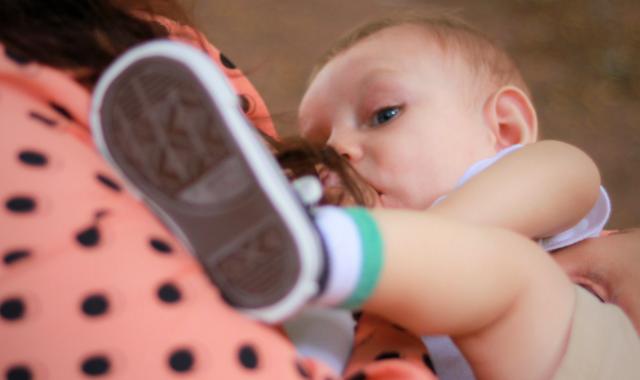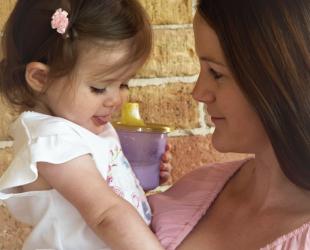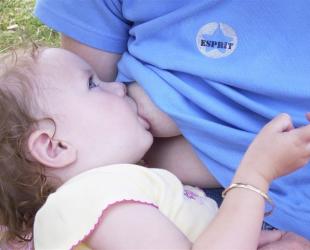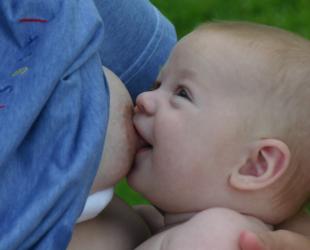Breastfeeding beyond the first year offers ongoing nutrition, comfort and protection.

Breastfeeding your toddler is completely normal and continues to support their health and development. It provides essential nutrients and immune protection while strengthening your bond.
Many mums enjoy breastfeeding beyond the first year—it can feel reassuring and convenient. If you hear comments that it’s time to stop, remember: the decision is yours. There are plenty of reasons why continuing can feel right for you and your child.
Why keep breastfeeding?
Breastfeeding during the toddler years is still about nutrition—but it’s so much more. Your milk continues to provide energy, protein, and key vitamins and minerals, while also offering comfort, security, and connection.
Here are some ways breastfeeding beyond the first year can support you and your child:
- Emotional security: Breastfeeding offers a safe space for toddlers as they navigate big feelings and new experiences.1
- Parenting tool: Breastfeeding is a practical way to soothe, comfort, and support your child—whether it’s calming a tantrum, settling after a busy day or managing tricky moments.
- Comfort during change: Breastfeeding can be especially reassuring for toddlers during times of change, like starting childcare, travelling or welcoming a new sibling.1
- Reconnection after separation: Many mums find breastfeeding is a helpful way to reconnect with their child after being apart due to work or study.
- Convenience: No need to prepare bottles or snacks when you’re out and about.
- Support during illness: When your child is unwell or refusing other foods, breastfeeding can keep them hydrated and nourished.
- Sleep support: Many parents find breastfeeding helps toddlers relax and drift off to sleep.
- Cultural or personal values: For some families, breastfeeding is part of their cultural practice or personal parenting philosophy.
What do experts say?
- The National Health and Medical Research Council (NHMRC) recommends breastfeeding for as long as mother and child want, even after starting solids.2
- The World Health Organization (WHO) suggests breastfeeding for at least 2 years.3
- Anthropological research shows the natural age for weaning in humans is between 2.5 and 7 years, so continuing to breastfeed your toddler is well within the range of normal.4
Nutrition that still counts
Breastmilk keeps playing an important role in your toddler’s diet, even after their first birthday.5 It’s more than just a drink—your milk is packed with energy, protein, and key vitamins and minerals that help your child grow and stay healthy.
For children between 12 and 23 months, breastmilk can provide:6
- about a third of their daily energy needs
- nearly half of their protein
- over a third of their calcium
- three-quarters of their vitamin A
- more than three-quarters of their folate
- almost all of their vitamin B12
- around 60% of their vitamin C
As your toddler grows, your milk naturally adapts to meet their changing needs. After the first year, levels of some nutrients and protective factors increase, offering ongoing support for your child’s growth, brain development, and immune system.7 When breastfeeding continues beyond 18 months, fat and protein levels increase to meet the growing energy needs of your child.8
Immunity and protection beyond babyhood
Breastmilk is packed with immune factors that help protect your child at every stage of breastfeeding. The levels of important proteins and immune components actually increase in the third and fourth years so breastfeeding continues to play a key role in building and supporting your child’s immune system throughout early childhood.8
Young children who aren’t breastfed tend to need hospital care more often during their first two years. Breastfeeding can mean fewer trips to the doctor when your child is unwell, and less time away from work for you.9
Longer breastfeeding helps reduce the risk of:
- Gastrointestinal,10 respiratory11and ear infections12
- Leukaemia13
- Dental malocclusions14
- Overweight and obesity15
- Lower IQ16
How continued breastfeeding supports mums
Long-term health
Breastfeeding for longer can lower your risk of:
- Breast cancer17
- Ovarian cancer18
- Type 2 diabetes19
- High blood pressure, heart disease, and stroke20
Fertility
- Breastfeeding may delay the return of your periods and fertility, especially if you are breastfeeding frequently and your child is under six months old. For some mums, this effect can last even longer.
Emotional wellbeing
- Many mums find that breastfeeding helps them feel close and connected to their child, especially during times of change or after being apart.
- Breastfeeding can be a source of comfort and reassurance for both you and your child.
- When your baby breastfeeds, hormones help produce and release your milk for your baby. But did you know they also act on your body to reduce stress, lower your blood pressure and help you feel calmer?21
- Some mums say that breastfeeding gives them a sense of confidence and satisfaction, knowing they are supporting their child’s health and development.
How is breastfeeding a toddler different?
- Toddlers may feed quickly and less often, or sometimes more frequently.
- They might breastfeed in new positions or be more active during feeds.
- You may need to find comfortable ways to hold your growing child.
Handling questions from others
Many parents who breastfeed beyond infancy didn’t plan to at first—their intentions changed as they learned more, overcame challenges, and experienced the positives of breastfeeding an older child. Support from healthcare providers and peer groups can make a big difference.
If someone asks why you’re still breastfeeding, a simple response like “It works for us” can help. You’re not alone—many families continue beyond the first year. Support is available through ABA groups and online communities.
Breastfeeding your toddler is your decision. If you’re ready to wean, there are gentle ways to do so. If you want to continue, you’re giving your child—and yourself—many lasting benefits.
© Australian Breastfeeding Association November 2025
Breastfeeding is the most powerful tool a mother of a toddler has. With a few quick sucks you can soothe a sore knee or a tantrum, or get an overtired child off to sleep in minutes. We'd be mad to give it up too quickly.
I couldn't bear to get up when Sam woke at 6:30 on those cold winter mornings. By breastfeeding we could stay cuddled up together in our big, warm bed for another half hour or so. It was a lovely way to start the day for both of us.
- Gribble, K. D. (2009). ‘As good as chocolate’ and ‘better than ice cream’: How toddler, and older, breastfeeders experience breastfeeding. Early Child Development and Care, 179(8), 1067–1082. https://doi.org/10.1080/03004430701764176
- National Health and Medical Research Council (2012, updated 2015). Infant feeding guidelines: Information for health workers. Canberra: NHMRC. https://www.nhmrc.gov.au/about-us/publications/infant-feeding-guidelines-information-health-workers
- World Health Organization. (2023). WHO Guideline for complementary feeding of infants and young children 6–23 months of age. https://www.who.int/publications/i/item/9789240081864
- Dettwyler, K.A. (1995). A time to wean: The hominid blueprint for the natural age of weaning in modern human populations. In: Stuart Macadam, P., & Dettwyler, K.A. (Eds.) Breast feeding: Biocultural Perspectives. (pp. 39-73). Aldine de Gruyter. https://doi.org/10.4324/9781315081984-2
- Lackey, K. A., Fehrenkamp, B. D., Pace, R. M., Williams, J. E., Meehan, C. L., McGuire, M. A., & McGuire, M. K. (2021). Breastfeeding beyond 12 months: Is there evidence for health impacts? Annual Review of Nutrition, 41, 283-308. https://doi.org/10.1146/annurev-nutr-043020-011242
- Dewey K. G. (2001). Nutrition, growth, and complementary feeding of the breastfed infant. Pediatric Clinics of North America, 48(1), 87-104. https://doi.org/10.1016/S0031-3955(05)70287-X
- Perrin, M. T., Fogleman, A. D., Newburg, D. S., & Allen, J. C. (2017). A longitudinal study of human milk composition in the second year postpartum: Implications for human milk banking. Maternal & Child Nutrition, 13(1), e12239. https://doi.org/10.1111%2Fmcn.12239
- Czosnykowska-Łukacka, M., Lis-Kuberka, J., Królak-Olejnik, B., & Orczyk-Pawiłowicz, M. (2020). Changes in human milk immunoglobulin profile during prolonged lactation. Frontiers in Pediatrics, 8, 428. https://doi.org/10.3389/fped.2020.00428
- Davisse-Paturet, C., Adel-Patient, K., Divaret-Chauveau, A., Pierson, J., Lioret, S., Cheminat, M., Dufourg, M.N., Charles, M.A., & de Lauzon-Guillain, B. (2019). Breastfeeding status and duration and infections, hospitalizations for infections, and antibiotic use in the first two years of live in the ELFE Cohort. Nutrients, 11(7),1607. https://doi.org/10.3390/nu11071607
- Duijts, L., Ramadhani, M. K., & Moll, H. A. (2009). Breastfeeding protects against infectious diseases during infancy in industrialized countries. A systematic review. Maternal & Child Nutrition, 5(3), 199–210. https://doi.org/10.1111/j.1740-8709.2008.00176.x
- Mineva, G. M., Purtill, H., Dunne, C. P., & Philip, R. K. (2023). Impact of breastfeeding on the incidence and severity of respiratory syncytial virus (RSV)-associated acute lower respiratory infections in infants: A systematic review highlighting the global relevance of primary prevention. BMJ Global Health, 8(2), e009693. https://doi.org/10.1136/bmjgh-2022-009693
- Bowatte G, Tham R, Allen K J, Tan D J, Lau M X Z, Dai X, & Lodge C J (2015). Breastfeeding and childhood acute otitis media: A systematic review and meta-analysis. Acta Paediatrica, 104(S467), 85–95. https://doi.org/https://doi.org/10.1111/apa.13151
- Amitay E L, & Keinan-Boker L. (2015). Breastfeeding and childhood leukemia incidence: A meta-analysis and systematic review. JAMA Pediatrics, 169(6). https://doi.org/10.1001/jamapediatrics.2015.1025
- Doğramacı E J, Rossi-Fedele G, & Dreyer C W (2017). Malocclusions in young children: Does breast-feeding really reduce the risk? A systematic review and meta-analysis. The Journal of the American Dental Association, 148(8), 566-574.e6. https://doi.org/10.1016/j.adaj.2017.05.018
- Horta B L, Rollins N, Dias M S, Garcez V, & Pérez-Escamilla R (2023). Systematic review and meta-analysis of breastfeeding and later overweight or obesity expands on previous study for World Health Organization. Acta Paediatrica, 112(1), 34–41. https://doi.org/10.1111/apa.16460
- Horta B L, Loret De Mola C, & Victora C G (2015a). Breastfeeding and intelligence: A systematic review and meta-analysis. Acta Paediatrica, 104. https://doi.org/10.1111/apa.13139 (Free full text available)
- Unar-Munguía M, Torres-Mejía G, Colchero M A, & González de Cosío T. (2017). Breastfeeding mode and risk of breast cancer: A dose–response meta-analysis. Journal of Human Lactation, 33(2), 422–434. https://doi.org/10.1177/0890334416683676
- Babic A, Sasamoto N, Rosner B A, Tworoger S S, Jordan S J, Risch H A, Harris H R, Rossing M A, Doherty J A, Fortner R T, Chang-Claude J, Goodman M T, Thompson P J, Moysich K B, Ness R B, Kjaer S K, Jensen A, Schildkraut J M, Titus L J, … Terry K L (2020). Association between breastfeeding and ovarian cancer risk. JAMA Oncology, 6(6), e200421–e200421. https://doi.org/10.1001/jamaoncol.2020.0421
- Horta B L, & de Lima N P (2019). Breastfeeding and type 2 diabetes: Systematic review and meta-analysis. Current Diabetes Reports, 19(1). https://doi.org/10.1007/s11892-019-1121-x
- Tschiderer, L., Seekircher, L., Kunutsor, S. K., Peters, S., O'Keeffe, L. M., & Willeit, P. (2022). Breastfeeding is associated with a reduced maternal cardiovascular risk: Systematic review and meta-analysis involving data from 8 studies and 1 192 700 parous women. Journal of the American Heart Association, 11(2), e022746. https://doi.org/10.1161/JAHA.121.022746
- Uvnäs Moberg K, Ekström-Bergström A, Buckley S, Massarotti C, Pajalic Z, Luegmair K, Kotlowska A, Lengler L, Olza I, Grylka-Baeschlin S, Leahy-Warren P, Hadjigeorgiu E, Villarmea S, Dencker A. (2020) Maternal plasma levels of oxytocin during breastfeeding-A systematic review. PLoS One. Aug 5;15(8):e0235806. https://doi.org/10.1371/journal.pone.0235806





